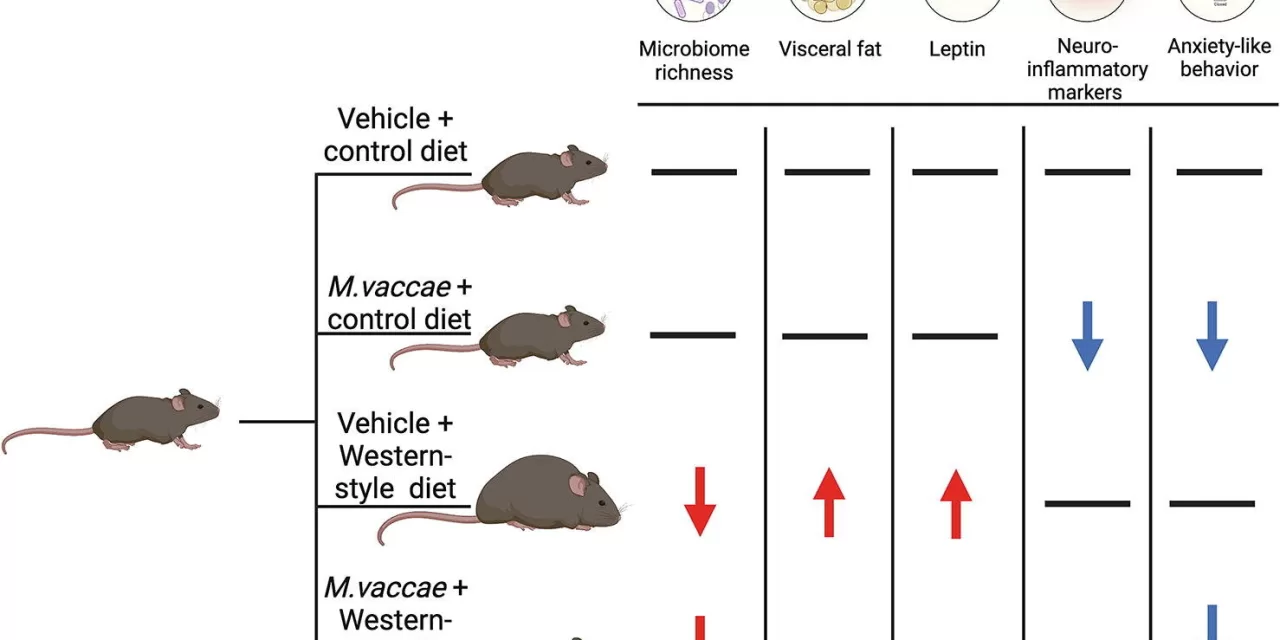As the new year rolls in, millions resolve to shed extra pounds, often turning to diets, exercise, and medication. Now, groundbreaking research from the University of Colorado Boulder suggests another surprising ally in the fight against weight gain: beneficial bacteria.
A study published in the journal Brain, Behavior, and Immunity reveals that weekly injections of a microorganism found in cow’s milk and soil could protect animals from weight gain, even on a high-fat, high-sugar diet.
“What is so striking about this study is that we saw a complete prevention of diet-related weight gain in these animals,” said Christopher Lowry, senior author and professor of integrative physiology. “This suggests that exposure to beneficial bacteria can protect us against some of the negative health outcomes of the typical Western diet.”
Rediscovering ‘Old Friends’
The study builds on the concept of “old friends,” healthy bacteria that co-evolved with humans but have become less common as modern lifestyles grow increasingly sterile. Lowry’s previous research demonstrated that Mycobacterium vaccae (M. vaccae), a microorganism found in soil and cow’s milk, can reduce stress-induced inflammation and related health problems in mice.
For this study, Lowry and his team explored whether M. vaccae could counteract the brain inflammation and anxiety linked to poor diets. The findings were astonishing: mice fed a high-fat, high-sugar diet but inoculated with M. vaccae gained significantly less weight than untreated mice on the same diet.
Surprising Results
Researchers divided adolescent mice into groups: some received standard healthy chow, while others ate a diet equivalent to fast food. Half of each group received weekly injections of M. vaccae. All the mice consumed the same number of calories, but the untreated “junk food” group began gaining more weight by week six.
By the end of the study, untreated junk food eaters weighed 16% more than their healthy counterparts and had more visceral fat, which increases the risk of heart disease and diabetes. Remarkably, mice treated with M. vaccae showed no difference in weight gain compared to healthy eaters, and they had less visceral fat.
“This finding suggests that M. vaccae effectively prevents the excessive weight gain induced by a Western-style diet,” said lead researcher Luke Desmond, a Ph.D. candidate.
The Path Forward
While the findings are promising, more research is needed to determine whether M. vaccae has the same effect on humans. Lowry speculates that the bacteria may influence immune cells, reduce inflammation, and boost metabolism.
Future studies will explore whether oral consumption of M. vaccae can yield similar results and whether it could help individuals lose existing weight.
For now, Lowry encourages reconnecting with beneficial bacteria by spending time outdoors, gardening, and eating fresh vegetables, which naturally absorb healthy microbes from soil.
Why Not Just Avoid Junk Food?
While ditching processed foods is ideal, Lowry acknowledges the challenges of resisting a diet rich in high-fat, high-sugar options.
“More than half of the food sold in grocery stores is junk food. It’s everywhere and hard to avoid,” he said. “If we can simply restore our exposure to these old friends, we could potentially prevent weight gain and other health impacts—even in the presence of our terrible Western diet.”
The research offers a glimmer of hope for tackling obesity and metabolic disorders in an increasingly fast-paced, convenience-driven world.
For more information, see the original study: Luke W. Desmond et al, Protective effects of Mycobacterium vaccae ATCC 15483 against “Western”-style diet-induced weight gain and visceral adiposity in adolescent male mice, Brain, Behavior, and Immunity (2024). DOI: 10.1016/j.bbi.2024.12.029.












